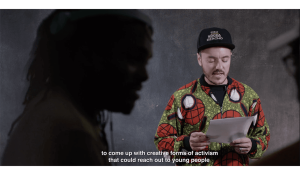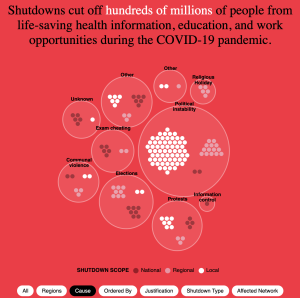
Freedom of expression is a basic requirement for maintaining democracy and open societies where citizens are able to stay informed, express opinions and participate actively in public life. Over the summer the Solidarity Action Network (SANE) explored different aspects of freedom of expression through a series of curated conversations looking at the role that international civil society organisations (ICSOs) can play in protecting and increasing free expression and civic space, particularly in relation to digital space and freedoms.
The first example came from Takura Zhangazha and Arthur Steiner from Hivos, who shared how Hivos has played an ‘incubator’ role in supporting young artists and makers to champion free expression, and to increase and even celebrate civic space. Through its R.O.O.M. Program Hivos has designed interventions that support young creatives, strengthening their resilience to remain critical and independent so that they can continue to challenge damaging narratives and shrinking civic space. Beyond the solidarity shown through this form of ‘incubation’ and direct support, Hivos has also made use of facilitation as a method of solidarity. The programme has facilitated the convening and connecting of young makers and creative hubs, enabling cross-fertilisation between these makers and other actors in support of Pan-African solidarity that can counter closing civic space.
These forms of solidarity are brought to life through stories of R.O.O.M Program partners – in particular, the Magamba Network based in Zimbabwe. The network focuses on the arts, digital media, activism and innovation. It has opened up space for free expression online through supporting and incubating young bloggers and new media start-ups speaking truth to power, and has inspired the creation of other, similar hubs in Southern Africa. As one of its activities, the network has convened discussions around the topic of internet access and ownership, inviting makers and creative hubs across the region to discuss the rise in internet regulations, cyber-crime laws, internet shutdowns, and – in some countries – the increasingly prohibitive costs of internet access.
 (Still from video: Who owns civic space? by Hivos featuring Magamba Network)
(Still from video: Who owns civic space? by Hivos featuring Magamba Network)
How international actors can show solidarity through support to local civil society actors to maintain and defend freedom of expression online, and protect online civic space, led us on to the next curated conversation with Felicia Anthonio from Access Now. Felicia shared insights on the role that Access Now has played in coordinating and convening #KeepItOn, a global campaign and coalition that aims to end internet shutdowns.
Members of the #KeepItOn coalition work together to prevent shutdowns through awareness-raising, advocacy, capacity-building and litigation. Access Now further builds resilience among affected communities through technical support and grassroots grants, and applies multiple forms of solidarity at local, national and international levels.

(Graphic from: #KeepItOn update: who is shutting down the internet in 2021? by Access Now)
The campaign uses public solidarity to tackle shutdowns, for example through advocacy at the global or national level calling for specific internet shutdowns to be ended. Tensions can arise between public solidarity on the one hand, and access on the other, and risks to access, staff or partners’ safety can act as barriers to ICSOs signing on to open letters or speaking out publicly on the issue of internet shutdowns. However, as the #KeepItOn coalition’s work demonstrates there is a spectrum of different modes of solidarity available to ICSOs.
There are different examples of more ‘quiet’ acts of solidarity that ICSOs can take, such as helping to document restrictions in a particular context, or supporting local communities or groups affected by a shutdown. The coalition itself employs multiple modes and levels of solidarity; for example combining awareness-raising at the multilateral level with litigation or advocacy at the national level, alongside strengthening of local capacities to deal with the impacts of shutdowns. So, whatever their appetite or capacity for risk might be, ICSOs can contribute to the protection of digital space and freedoms, and joining the #KeeptItOn Coalition can be an effective first step.
Further details about these two examples can be found in the Solidarity Playbook, in the case studies on Hivos and Access Now which cover strategies for the protection of online free expression, as well as its potential to bring about social change, revealing different strategies for solidarity in the face of closing civic space. We encourage you to delve deeper into these topics by reading the cases!